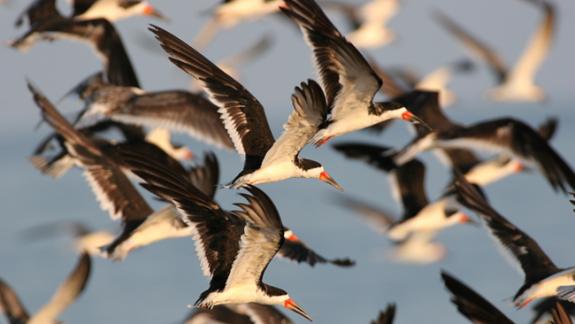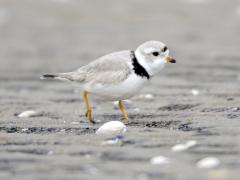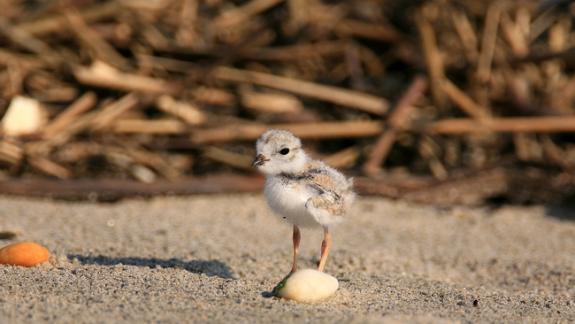Beach Nesting Bird Project
Conserve Wildlife Foundation of NJ tirelessly works to monitor and protect beach nesting birds in New Jersey.
 Black skimmers in flight. © Steve Byland
Black skimmers in flight. © Steve Byland
NEWS: Results from the 2023 nesting season have been published online (12/1/23). View and download the reports via the links below:
>> 2023 Beach Nesting Bird Project Summary
>> Piping Plover Nesting Results in New Jersey: 2023
Piping plovers, least terns, and black skimmers, referred to collectively as beach nesting birds, are among New Jersey’s rarest and most threatened wildlife species. All three species are listed as endangered in New Jersey and, in addition, the Atlantic Coast population of the piping plover is federally listed as threatened along its entire range. American oystercatchers, a species of special concern in the state, also nest (and winter) on our beaches.
As the name suggests, these birds nest directly on the beach, laying their eggs in shallow depressions they scrape in the sand. They arrive in early spring to set up territories and then remain throughout the summer to lay their eggs and raise their young. Because this coincides with the summer tourist season when millions of people flock to our state’s beaches, human disturbance poses a great risk to beach nesting birds.
The number of beaches remaining in New Jersey where these birds can successfully nest is already significantly reduced from their historic levels because of intensive coastal development and the alteration of the natural habitat. Furthermore, predators, such as gulls, crows, red foxes, raccoons, skunks, cats, and even coyotes, are a severe threat to the birds, eating their eggs, chicks, and sometimes the adults themselves. Although some of these species are natural predators, their numbers have grown unnaturally in recent years, aided by an abundant year-round food supply provided by humans. Flooding is also a serious threat to beach nesting birds, and although they can survive periodic washovers, the specter of sea-level rise as a result of global warming, raises new concerns about the long-term survival of our state’s beach nesting birds.
 Zoom+ A Piping plover. © Robert Lin
Zoom+ A Piping plover. © Robert Lin
Because of this wide array of threats, beach nesting birds are some of New Jersey’s most intensely managed species. Each year nesting areas are protected with fence and posted with signs to alert beachgoers where birds are nesting and to prevent nests and young from being trampled or run over. Special cages called predator exclosures are placed over many piping plover nests to prevent predators from destroying their eggs. In some cases, especially for red fox, electric fence is also utilized. Paid seasonal stewards and dedicated volunteers patrol the nesting areas to monitor human disturbance and other recreational activities, as well as educate beachgoers. It is highly unlikely these birds would survive on New Jerseys’ beaches without this extensive protection.
The Conserve Wildlife Foundation of NJ oversees the Beach Nesting Bird Project for the state working in close partnership with the Division of Fish and Wildlife – Endangered and Nongame Species Program. It also helps coordinate protection efforts with a variety of other statewide partners, including the U.S. Fish and Wildlife Service, National Park Service, The Nature Conservancy, U.S. Coast Guard, Rutgers University, and Monmouth University, among others. Furthermore, it helps manage or train volunteers, including groups such as Wreck Pond Watershed Association, Shark River Cleanup Coalition, and Seven Presidents Oceanfront Park, as well as numerous individual volunteers.
In addition to managing the day-to-day operations of this massive coast-wide protection effort during the breeding season, the Conserve Wildlife Foundation of NJ, through its Beach Nesting Bird project manager, works behind the scene to aid recovery of these species. Beach management plans are being developed and implemented with coastal communities to minimize impacts on beach nesting birds from municipal management, maintenance, and use of the beach. Data collected during the breeding season is used to track populations, gauge reproductive success, and identify threats. Although less glamorous than “hands-on” work directly with wildlife, these efforts are also critical for the conservation of beach nesting birds.
 A piping plover chick can find food on the beach within hours of hatching. © Bill Dalton
A piping plover chick can find food on the beach within hours of hatching. © Bill Dalton
Share the Shore
If you live near or are visiting our beaches, you can help protect beach nesting birds by following a few simple rules:
- Respect all areas fenced or posted for the protection of wildlife.
- Do not chase, approach, or linger near birds or their nesting areas, or in anyway harass birds.
- Control dogs (or better yet leave them home). Dogs can chase or frighten adult birds and their chicks, sometimes even eating or stepping on eggs and chicks. Dogs are not permitted on most beaches during the nesting season, but if they are allowed, keep them leashed and well away from nesting areas.
- Keep cats indoors. Cats kill millions of birds each year, including our beachnesters.
- Do not leave or bury trash or food scraps on the beach. Garbage attracts predators, such as gulls, crows, red foxes, raccoons, skunks, and cats, which may prey upon eggs or chicks. And please do not feed any of these predators.
Learn More:
Beach nesting bird brochure - 1.0MB |
Reports:
2009 Piping Plover Nesting Results - 181.6KB |
2010 Piping Plover Nesting Results - 237.0KB |
2011 Piping Plover Nesting Results - 362.8KB |
2012 Piping Plover Nesting Results - 1.7MB |
2013 Piping Plover Nesting Results - 389.3KB |
2014 Piping Plover Nesting Results - 513.6KB |
2015 Piping Plover Nesting Results - 370.0KB |
2016 Piping Plover Nesting Results - 394.5KB |
2017 Piping Plover Project Report - 4.3MB |
2018 Piping Plover Project Report - 450.5KB |
2018 Beach Nesting Bird Project Summary - 669.0KB |
2019 Beach Nesting Bird Project Report - 711.1KB |
2019 Piping Plover Project Report - 445.6KB |
2020 Beach Nesting Bird Project Report - 667.2KB |
2020 Piping Plover Project Report - 632.9KB |
>> 2021 Beach Nesting Bird Project Report
>> 2021 Piping Plover Project Report
>>2022 NJ Piping Plover Summary Report
>> 2022 NJ Beach Nesting Bird Project Summary
Journal Articles:
Overview of Beach-Nesting Birds in New Jersey - 8.1MB |
The Role of Inlets in Piping Plover Nest Site Selection in New Jersey 1987-2007 - 2.0MB |
Restoring Beaches for Atlantic Coast Piping Plovers - 625.8KB |
Modeling Foraging Behavior of Piping Plovers to Evaluate Habitat Restoration Success - 179.2KB |
Piping Plover Trends - 2.7MB |
Least Tern Trends - 3.2MB |
Black Skimmer Trends - 2.2MB |
Media Articles:
JERSEY; Plover Lovers Ruffle Some Feathers- New York Times, 5/29/2001
A Taste of Champagne - Island - 431.2KB |
Volunteers Helping State Monitor Plover Population - New York Times, 5/8/2009
Research Team Visits Abaco to Conduct Bird Survey - 109.9KB |
Endangered Species in Sea Bright - 1.2MB |
Partnering for Piping Plovers A Conservation Sucess Story - 118.7KB |
Assessing Hurricane Sandy's Impact on Wildlife - 303.4KB |
Great Expectations for Piping Plovers at the Shore - 4.5MB |
Blog:
CWFNJ Beach Nesting Bird Blog Posts
Videos:
Wildlife Assessment Post Hurricane Sandy at North Brigantine Natural Area, NJ
Wildlife Assessment Post Hurricane Sandy at Stone Harbor Point, NJ
Wildlife Assessment Post Hurricane Sandy at Strathmere Natural Area, NJ
American Oystercatcher Banding Project in New Jersey
Other Resources:
Comprehensive Conservation Strategy for the Piping Plover in its Coastal Migration & Wintering Range - 1.1MB |
U.S. Fish and Wildlife Service Piping Plover website for the Atlantic Coast population
Listen to a Piping Plover podcast with the U.S. Fish and Wildlife Service
Contact Us:
Todd Pover, CWF Senior Wildlife Biologist: Email
609.306.4475
Find Related Info:
American Oystercatcher Project





